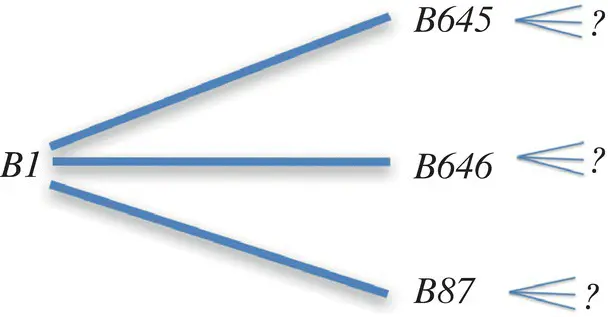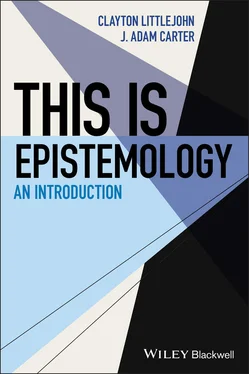B1 (Belief 1). Rental prices will continue to increase in London in the coming year.
B2. There are ghosts.
You are fairly confident that B1 is justified and that B2 is not, and this is helpful because if whatever sorting method or rule you apply doesn't get these rather easy cases right, it's – like flipping a coin – probably not a very good way to sort the justified from the unjustified beliefs. 5
1.9At any rate, it seems like something must account for why B1 and B2 differ in their being justified. 6 In a bit more detail, B1 must have some feature that B2 lacks, and this feature must surely account for the difference in justification.
1.10This basic idea – that any difference in justification must be explained by some other difference that is not itself just a difference in justification – is an instance of a more general philosophical principle which is helpful for thinking about normative matters. Call it the Principle of Sufficient Difference . 7
Principle of Sufficient Difference : if there is some normative difference between X and Y, there must be some further non‐normative difference between X and Y that is responsible for this normative difference: that is, there must be some non‐normative feature F such that (i) X has F, (ii) Y lacks F, and (iii) this difference is responsible for the normative difference between X and Y.
Note that the Principle of Sufficient Difference is not itself a full‐blown method for determining which of your beliefs are justified. But it is a principle that any good method you apply with that aim in mind will have to respect. (Consider that a method that did not respect this principle would have to allow, for example, that two beliefs could have all the same properties with the exception that one of them is justified and the other is not. But that would be quite a pill to swallow.)
1.11Back to business. With the Principle of Sufficient Difference in hand (along with an intuitive sense that B1 is justified and B2 is not), can you think of any difference between B1 and B2 that might plausibly account for why B1 is justified and B2 is not? If so, you're in a good position to appeal to this very difference when proposing a method for sorting your justified from your unjustified beliefs. 8
1.12But what might such a feature be? What seems to favorably distinguish your belief that rental prices will continue to increase in London in the coming year from your belief that there are ghosts? As you look through the pages of Your Book of Beliefs , you notice a good candidate for such a feature: you find various other entries that support B1. By ‘support’ here, what is meant is: entries that might serve as premises of good arguments, arguments that support B1. For example, you come across these entries:
B645. There will not be an increase in the supply of housing in London during the coming year.
B646. There will be increased demand for housing in London during the coming year.
B87. Price will increase if there is an increase in demand without an increase in supply.
B645, B646, and B87 all support B1. You don't see any other beliefs that support the ghost belief. So here's one difference between B1 and B2: B1 is supported by further beliefs, and B1 is not. Perhaps extrapolating from this difference will give us a good rule for determining which beliefs get to be entries in Your Book of Justified Beliefs :
Supporting Belief Rule : an entry in Your Book of Beliefs gets to be an entry in Your Book of Justified Beliefs iff it is supported by further beliefs.
The Supporting Belief Rule seems like a promising idea until you notice that there's another entry in the book:
B465789. Your friends at school saw a ghost when they were camping.
You still think that B2 isn't justified, but the Supporting Belief Rule suggests that it is justified – after all, it is supported by a further belief: B465789.
1.13The Supporting Belief Rule isn't a good rule. If it's silly to believe in ghosts, it's silly to believe that your friends saw a ghost. If a silly belief supports another silly belief, they remain equally silly, and neither seems to be a good candidate for justification. (Compare: you can't boost the strength of a weak link in a chain by supporting it with another weak link.) The trouble with the Supporting Belief Rule , then, seems to be that it doesn't place any sensible restrictions on which beliefs could confer justification by providing this support.
1.14To fix this, we might modify the rule as follows:
Supporting Justified Belief Rule : an entry in Your Book of Beliefs gets to be an entry in Your Book of Justified Beliefs iff it is adequately supported by more justified beliefs. 9
That's better, surely, for it explains why B2 doesn't get into Your Book of Justified Beliefs . It isn't justified, because the only beliefs that support it are unjustified. Notice, however, that if we move to the Supporting Justified Belief Rule , we face a new and entirely different problem.
1.15In explaining why B1 is justified, you cited further beliefs (i.e. B645, B646, and B87). There's a nice little argument that takes you from these beliefs to B1, but the argument doesn't justify B1 unless its premises are themselves justified. So: are B645, B646, and B87 justified or not?
1.16The Supporting Justified Belief Rule tells us that we need more justified beliefs (and not merely more beliefs) that support B645, B646, and B87 if these beliefs are going to justify B1. Convinced that B1 really is justified, you press on. Surely something must support B645, B646, and B87. So surely these further beliefs contained in the pages of Your Book of Beliefs will show that B1 belongs in Your Book of Justified Beliefs .
1.17The situation we face here is similar to the situation we faced earlier. We notice that there's a normative difference between two things (e.g. B1 and B2). The Principle of Sufficient Difference tells us that such a difference is possible only when there's some further difference that accounts for it (e.g. B1 is supported by justified beliefs and B2 is not). When we cite the factors that distinguish a justified belief like B1 from an unjustified belief like B2, the Supporting Justified Belief Rule tells us that the factors will be more justified beliefs (e.g. B645, B646, and B87). The Principle of Sufficient Difference will apply again to these new beliefs and the Supporting Justified Belief Rule will tell us that we need beliefs other than B645, B646, and B87 to justify B645, B646, and B87 ( Figure 1.1). This could go on for a while, in a way that seems to threaten an infinite regress .

Figure 1.1 The Supporting Justified Belief Rule tells us that we need beliefs other than B645, B646, and B87 to justify B645, B646, and B87.
1.18It is beginning to look as though demonstrating that B1 is justified (which we originally thought was obviously justified) is difficult to do. And this looks like a problem – what epistemologists call a regress problem . After all, repeated application of the Supporting Justified Belief Rule tells us to find more and more justified beliefs (threatening infinite regress), but perhaps the required stock of justified beliefs just isn't there.
1.19One somewhat depressing move at this juncture is to abandon the attempt to show that B1 (or any other of your beliefs is justified) and simply accept skepticism about epistemic justification :
Читать дальше













